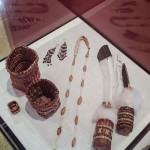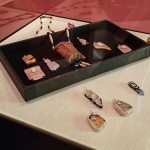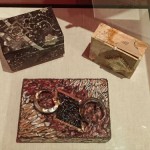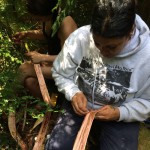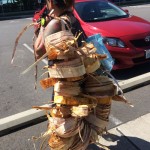Category: Tulalip News
Tulalip Hibulb Cultural Center has new smokehouse
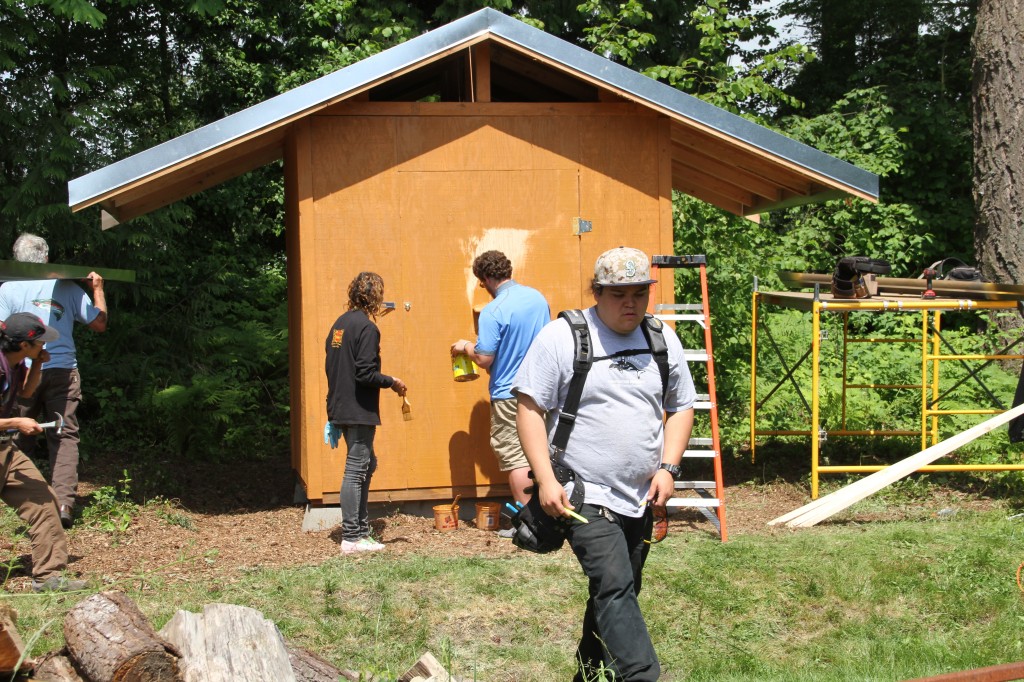
TCTC students build new smokehouse at the Hibulb Cultural Center
By Andrew Gobin, Tulalip News. Photos by Francesca Hillery, Tulalip Public Affairs.
The Hibulb Cultural Center and Natural History Preserve has a new smokehouse, thanks to a team of students from the Tulalip TERO Construction Training Center (TCTC). Instructor Mark Newland and his students completed the structure in three days. After the work was finished, Hibulb staff and the Rediscovery program served a lunch of traditional foods and honored Newland and his team with blankets.
“Everything went well with the smokehouse. Everyone seemed happy with how it turned out,” said Rediscovery Program Coordinator, Inez Bill-Gobin.
She plans to use the smokehouse for community purposes, and for classes offered at the center through the Rediscovery program. The first group to use the smokehouse will be the canoe family, who hopes to incorporate traditional foods and traditional food preparation into their summer activities.
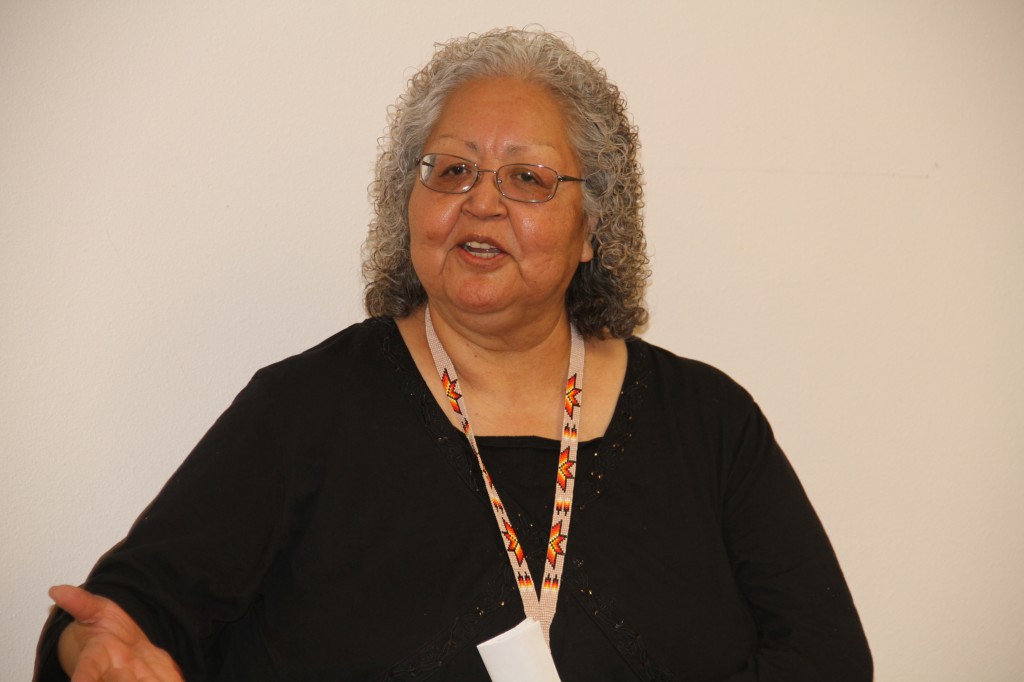
Bill-Gobin said, “For the continuation of our culture, we need to have these things in place.”
The smokehouse was built to replace the old smokehouse after its roof collapsed. The old structure came from the original cultural resources building, and was not the most structurally sound. The new smokehouse is built to last, complete with stained siding, a tin roof, and extended eaves on both sides for covered space to prepare racks of fish, clams, or meat.
Teams from TCTC may return in the fall, at the start of a new term, to complete other projects at the Hibulb Cultural Center, including a covering over the fish cooking pit and a boardwalk through the Natural History Preserve.
Research program helps diabetics lower stress levels
By Brandi N. Montreuil, Tulalip News
 TULALIP- Healthy Hearts, Healthy Minds is a research program focusing on Native American cardiovascular disease (CVD) and diabetes patients residing on the Tulalip Reservation, or within 20 miles of the reservation. Their goal is to lower stress levels in patients resulting from CVD and diabetes management.
TULALIP- Healthy Hearts, Healthy Minds is a research program focusing on Native American cardiovascular disease (CVD) and diabetes patients residing on the Tulalip Reservation, or within 20 miles of the reservation. Their goal is to lower stress levels in patients resulting from CVD and diabetes management.
The program is taught through weekly sessions over a 3-month period, and is individually focused. Participants are required to have a medical diagnosis of CVD, diabetes, or pre-diabetes. Culturally sensitive curriculum features coping skills and self-care techniques based on diagnosis requirements.
“Research found that Natives have this problem with CVD and diabetes. They are at a really high risk for getting these disorders. The idea is to try to find out what it is that is making them more at risk and to find an intervention,” said June LaMarr, program’s community principle investigator.
While the program does not treat diabetes patients as the Tulalip Diabetes Program offered at the Tulalip Karen I. Fryberg Health Clinic does, the project coordinator Michelle Tiedeman explains collaboration between the two programs ensures all healthcare concerns are addressed in patients.
“Their program focuses on the diabetes portion, we are addressing those symptoms of stress resulting from diabetes self-care management. The idea is we are hoping to lower those levels in order to increase those diabetes self-care behaviors that are needed to maintain glucose levels,” said Tiedeman.
In each session participants can expect help identifying stress triggers and develop tools to reach goals relating to diabetes care. Participants are requested to complete a base-line assessment, which includes a fasting blood draw, brief physical assessment, and a survey questionnaire, before starting their first session.
There is no cost to participate in the program, but participants are provided a small incentive for participating and can earn up to $190 in gift cards and checks.
“We are looking for people who are experiencing some type of stress in managing those diabetes self-care behaviors. We are trying to help them learn ways to feel less overwhelmed by everything they are asked to do, and help them basically fall into a healthy routine with their diabetes,” said Tiedeman. “We don’t want people to think they can’t participate in both diabetes programs, we want ours to be viewed as an additional service. Because it is a research project, we are hoping that the program is found effective, so we can look to the future and maybe offer something more sustainable in the community.”
Healthy Hearts, Healthy Minds is funded by the National Institutes of Health and National Institute on Minority Health and Health Disparities. For more information in participating in the program or the program itself, please contact 360-716-4896 or email healthyhearts@iwri.org.
Brandi N. Montreuil: 360-913-5402; bmontreuil@tulalipnews.com
Northwest Indian College Tulalip Campus Graduation June 20
Students’ work featured at Longhouse Gallery
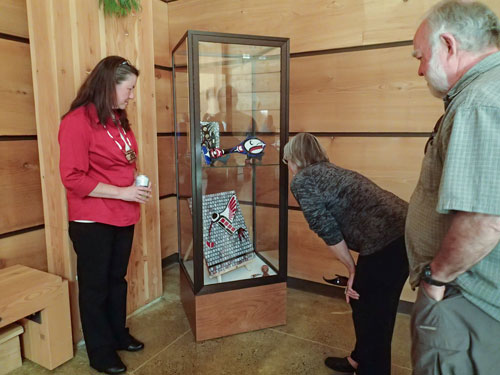
Photo/ Brandi N. Montreuil, Tulalip News
By Brandi N. Montreuil, Tulalip News
PORT ANGELES – Student artwork from the Northwest Indian College Tulalip Campus traveled 96 miles to the Longhouse Art Gallery at Peninsula College for a first-time exhibit. Northwest Indian College Art Classes is a compilation of the work of a dozen students and art instructor Bob Mitchell, which features art produced during NWIC’s winter quarter.
Pieces included glass mosaics, basketry, beading, and handmade jewelry using various art mediums. The exhibit’s centerpiece is a large story pole made with fused glass, featuring students’ Native American culture using animal designs.
On June 5, the Peninsula College held a VIP opening, welcoming local guests and students.
“The class has really expanded,” said Bob Mitchell, who began teaching art at the Tulalip campus five years ago. “We are doing glass fusing and jewelry. I can look over in class and see basket weaving and
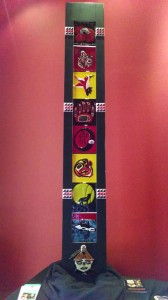
Photo/ Brandi N. Montreuil, Tulalip News
people passing on those skills to other people. The class is pretty student directed and the story pole is a good example of that. I came in with the idea and the frame, and we started thinking about how we could incorporate it into class. We gave everybody a panel and decided to do a theme and let everybody interpret it based on their culture. The student directive was they wanted to use traditional colors red, black, yellow, and white. We fused it and we finished with mosaic triangles that are a representation of bear claws from Tulalip.”
The story pole’s success means that future classes will be designing their own story poles. “The students bring a lot to the class with their skills. I feel very honored a lot of the time being in the class working alongside them. We need to show off what they are doing, so this is pretty impressive,” explained Mitchell.
Current NWIC Tulalip campus student Monica McAlister, whose work in the exhibit includes basketry and glass mosaics, said working on the exhibit and class project helped to keep her connected to her Yurok culture.
“Being at NWIC is like a home away from home. It connects you to culture and with people that support you. It is really uplifting to be able to get that sense of community, which for me was lacking for a long time because I am not from here. I took Bob’s class in 2012 and I fell in love with glass art. Art is such a big part of my life now and it makes me happy, and this all started because of NWIC.”
The Peninsula College Longhouse Art Gallery will be showing the original artwork of Bob Mitchell and students from NWIC now through August. The exhibit features NWIC Tulalip campus students Monica McAlister, Louis Michell, Denise Michell, Ed Hill, Shirley Jack, Alicia Horne, Sarah Andres, Teesha Osias, Annette Napeahi, Raven Hunter, Tatiana Crawford, Mark Hansen, and John Martin.
For more information on the exhibit please visit www.pencol.edu.
Brandi N. Montreuil: 360-913-5402; bmontreuil@tulalipnews.com
ROLL OUT THE RED CARPET FOR DAD THIS FATHER’S DAY
Treat Your Patriarch Like Royalty at Tulalip Resort Casino
Source: Tulalip Resort Casino
 Tulalip, Washington — This June 15th take Dad out for more than burgers on the grill. Treat him to all his favorites at the Tulalip Resort Casino Father’s Day brunch. From 11:30 am to 2:00 pm in the Orca Ballroom, Mom and the kids can also indulge him in everything from photos to football.
Tulalip, Washington — This June 15th take Dad out for more than burgers on the grill. Treat him to all his favorites at the Tulalip Resort Casino Father’s Day brunch. From 11:30 am to 2:00 pm in the Orca Ballroom, Mom and the kids can also indulge him in everything from photos to football.
Tulalip chefs have created all of Dad’s top picks – including prime rib, barbecue chicken, pork ribs, fajitas and a scrumptious sundae dessert bar. Of course, there will be an array of salads and other delicious breakfast selections to round out the feast. He also can participate in games such as a 9-hole mini golf course, double shot basketball, football quarterback blitz, skeeball, and air hockey or simply watch sports on the big screen. Catch a snap of the fun and feasting with the onsite photographer—an ideal memory maker.
Celebrate Dad in the grand style he deserves at Tulalip Resort Casino. Father’s Day brunch is priced at $35 per adult and $16 for children 12 and under. For a reservation call (360) 716-6888.
About Tulalip Resort Casino
Award winning Tulalip Resort Casino is the most distinctive gaming, dining, meeting, entertainment and shopping destination in Washington State. The AAA Four Diamond resort’s world class amenities have ensured its place on the Condé Nast Traveler Gold and Traveler Top 100 Resorts lists, as well as Preferred Hotel & Resorts membership. The property includes 192,000 square feet of gaming excitement; a luxury hotel featuring 370 guest rooms and suites; 30,000 square feet of premier meeting, convention and wedding space; the full-service T Spa; and 7 dining venues, including the AAA Four Diamond Tulalip Bay Restaurant. It also showcases the intimate Canoes Cabaret and a 3,000-seat amphitheater. Nearby, find the Hibulb Cultural Center and Natural History Preserve, Cabela’s; and Seattle Premium Outlets, featuring more than 110 name brand retail discount shops. The Resort Casino is conveniently located between Seattle and Vancouver, B.C. just off Interstate-5 at Exit 200. It is an enterprise of the Tulalip Tribes. For reservations please call (866) 716-7162.
Tulalip Lushootseed teachers harvest cedar for funerals use
Parisian Prom: Native prom at the Marysville Opera House

By Andrew Gobin/Tulalip News
Tulalip Youth Services presented Native Prom – A Night in Paris the evening of May 30. With donated ball gowns and tuxedos, as well as volunteer stylists, Youth Services wanted to give everyone the chance to look their best for a night of elegance. Hosted at the historic Marysville Opera House, students stepped into a world of sophistication.

Photo: Andrew Gobin/Tulalip News
As prom began, volunteer stylists Tisha McLean, Yvonne Williams, and Celum Hatch were just finishing up helping girls with their hair and makeup in one of the house dressing rooms. As more students arrived, the hardwood filled with dancers.
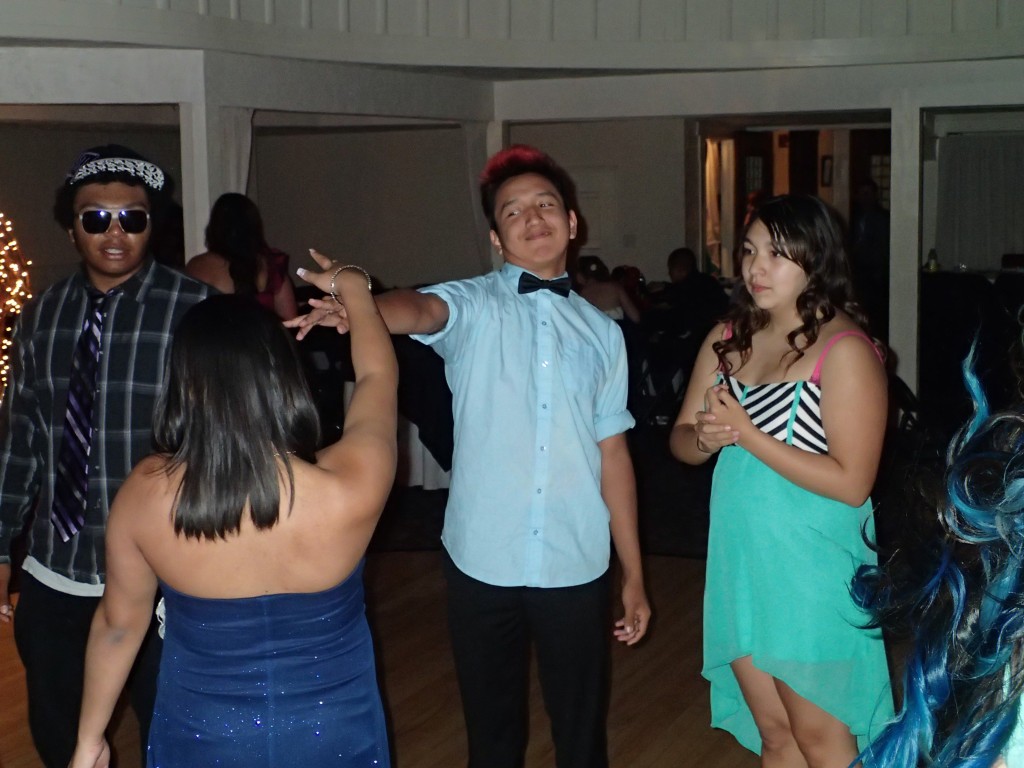
Photo: Andrew Gobin/Tulalip News
While the setting was a scene from the roaring twenties, students danced to the modern tunes of Steve Aoki, Sir Mix-A-Lot, and the Ying yang Twins. And where would any high school dance be without the signature, choreographed group dance? As most school dances have played the Y.M.C.A., The Hustle, and the Electric Slide throughout the latter half of the twentieth century, the newest group dance craze is Cupid’s, Cupid Shuffle.

Photo: Andrew Gobin/Tulalip News
Finally, the anxiously awaited announcement of the Prom Royalty. Selected at the dance, couple Ayrik Miranda and Samantha Marteney were crowned Prince and Princess. Becca Marteney was crowned Prom Queen, with Heritage Hawks star Bradley Fryberg the reigning Prom King.
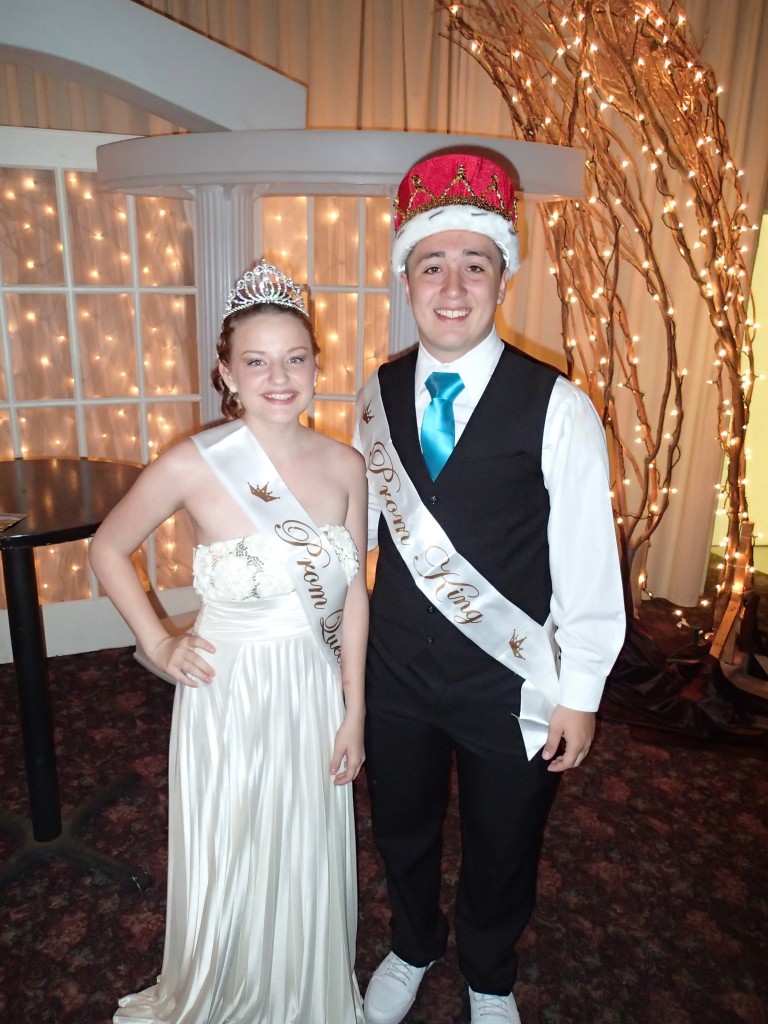
Photo: Andrew Gobin/Tulalip News

Photo: Andrew Gobin/Tulalip News
Check out more photos here
Andrew Gobin is a staff reporter with the Tulalip News See-Yaht-Sub, a publication of the Tulalip Tribes Communications Department.
Email: agobin@tulalipnews.com
Phone: (360) 716.4188
Strawberry King and Queen crowned at Tulalip elders lunch: Tribal offices donate gift baskets for raffle
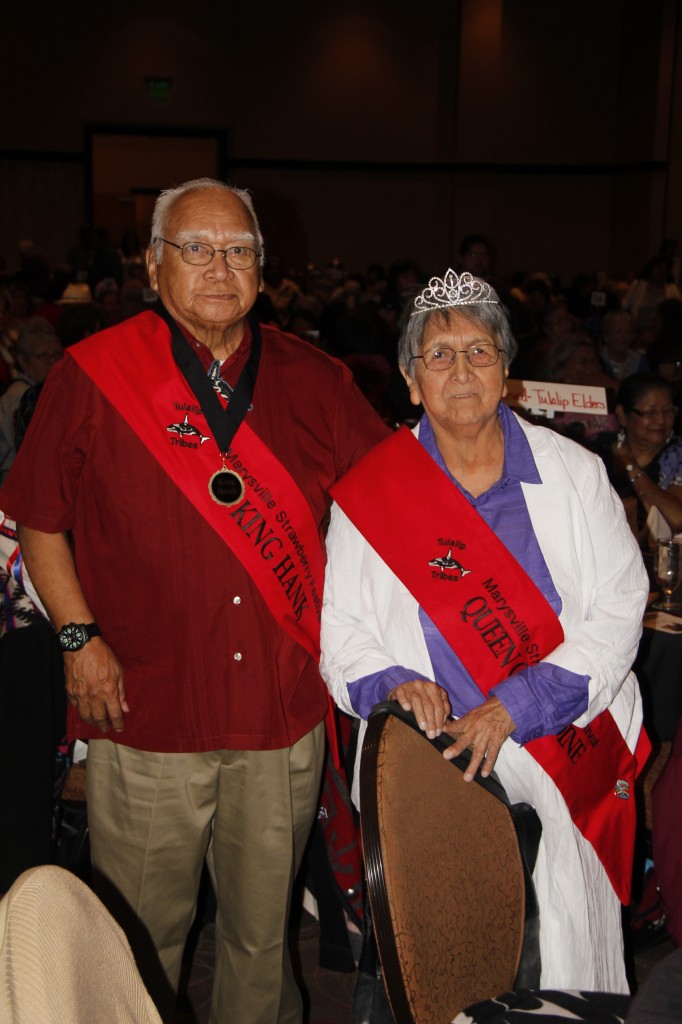
Photo: Andrew Gobin/Tulalip News
By Andrew Gobin/Tulalip News
The Marysville Strawberry Festival Senior and Junior Royalty crowned Geraldine and Hank Williams as Strawberry King and Queen at Tulalip’s elder luncheon May 29. Each year, Tulalip elders nominate two of their own to be crowned at the annual elder luncheon.
“I look around every year to see who deserves a nomination. Geraldine and Hank have paid their dues to the community,” said Tulalip elder Virginia Carpenter, who nominated this year’s royalty.
The luncheon is much more than a celebration of the Strawberry Court, it is an intertribal event, open to all indigenous elders. Nearly 900 elders from Pacific Northwest Native communities from as far north as Alaska, and from around Washington and Oregon attended. Many of the tribal offices donated gift baskets to be raffled off at the event.
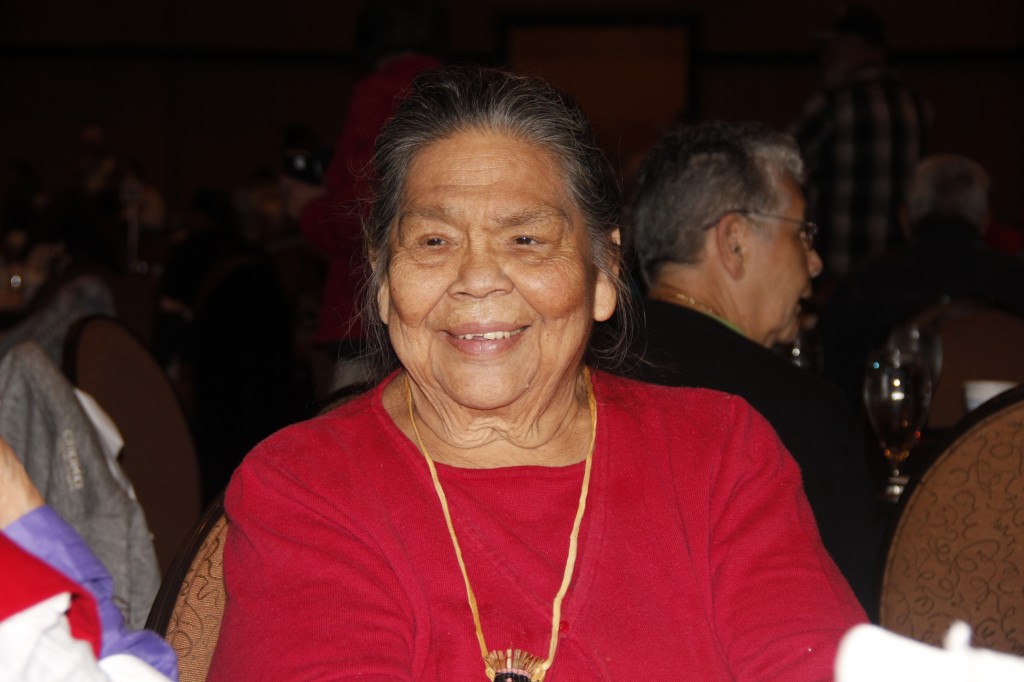
Photo: Andrew Gobin/Tulalip News
“I come because I’m so old. Oh, just kidding,” said Tulalip elder Loretta James. “I come to see everyone. And I like to see all the different departments chip in for the gift basket give away. I like to see them give back to this community.”
Tulalip elder Richard ‘Two Dogs’ Muir said, “I come for the company, and for the stories. Look around this room, at how much history is sitting in this room, all the advice. Quote of the day so far is, ‘Be true to yourself, pay no attention to what other people think.’ There is so much more to learn from these elders too, if you would just talk with them.”
Two Dogs donated a special beaded rattle to the raffle.
He said, “I only work when I am in the right mindset, no negative thoughts. So this rattle is lucky to whoever wins it.”
Everyone was smiling and having a good time, joking and teasing one another.
Francis Peters of Swinomish joked, “I thought I was too old for these things, but I guess not. I wasn’t coming down here, but I guess I got too close to the elder building, and they twisted my arm and put me on the van.”
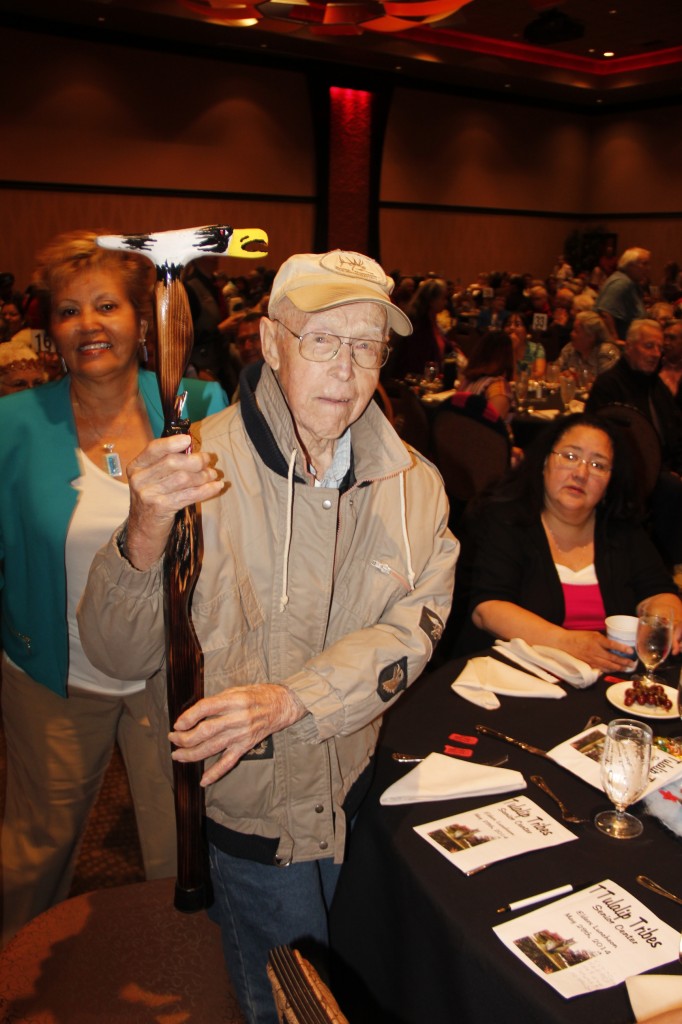
Photo: Andrew Gobin/Tulalip News
The Tulalip Tribes honored the eldest visiting man and woman, who were Mickey Walker, 97, of Kingman Arizona, and Amelia Sohappy, 92, of Yakima. Charlie ‘Red’ Sheldon was honored as the oldest Tulalip, who just celebrated his 98th birthday on May 5.
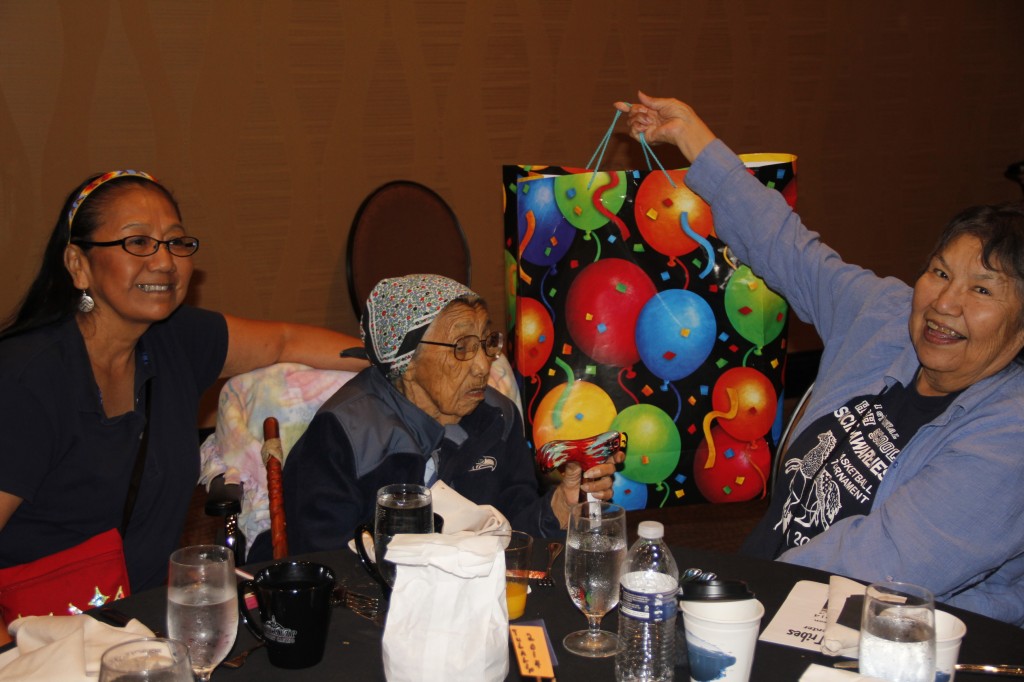
Photo: Andrew Gobin/Tulalip News
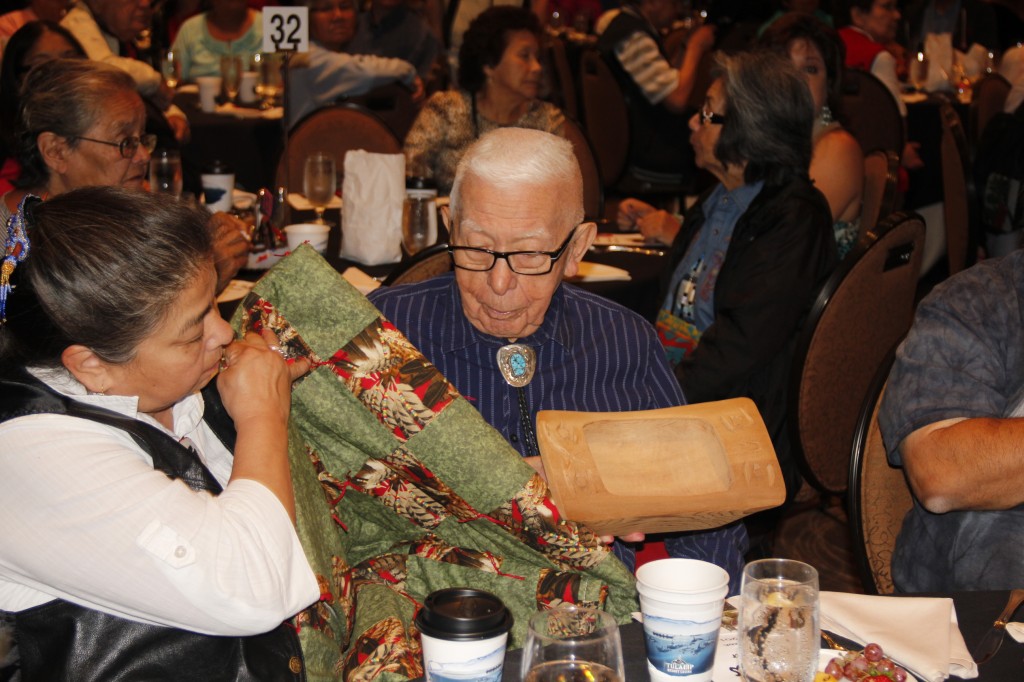
Photo: Andrew Gobin/Tulalip News
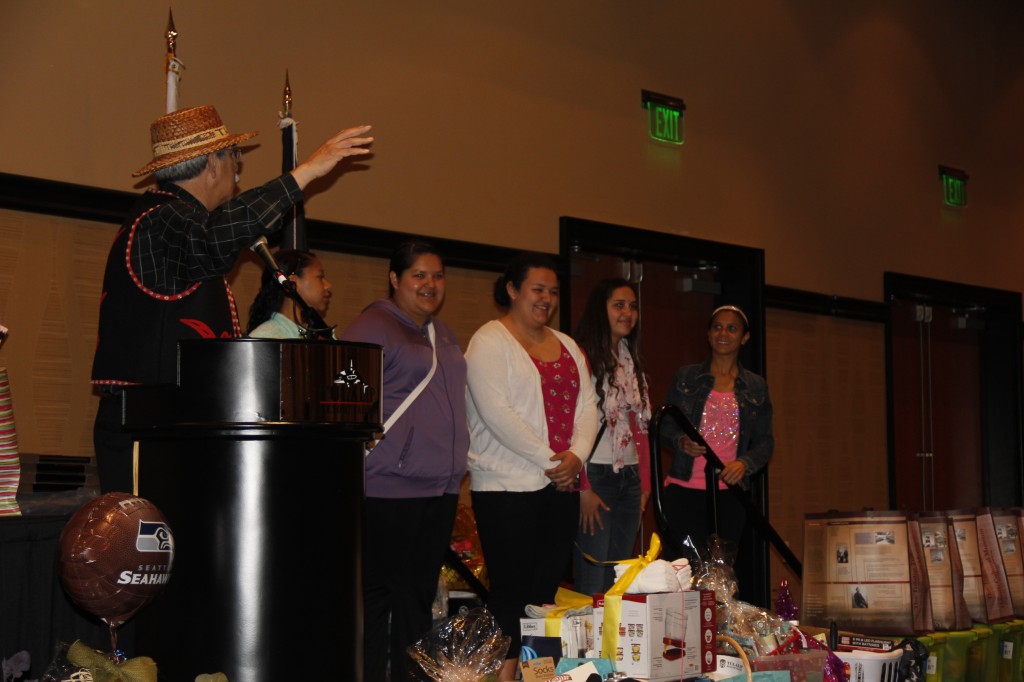
Photo: Andrew Gobin/Tulalip News
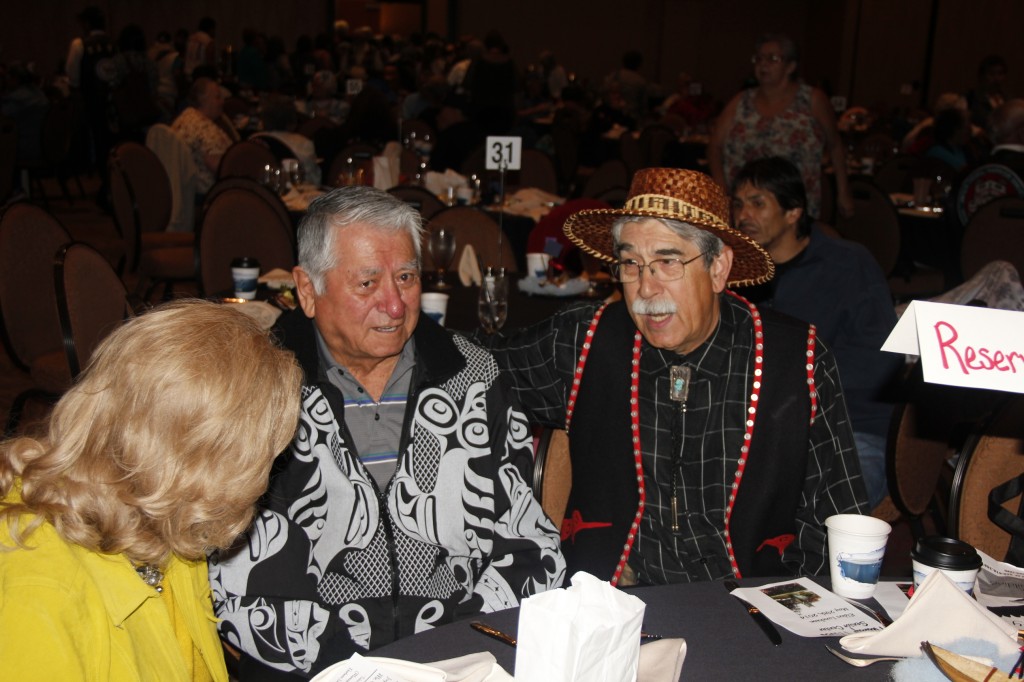
Photo: Andrew Gobin/Tulalip News
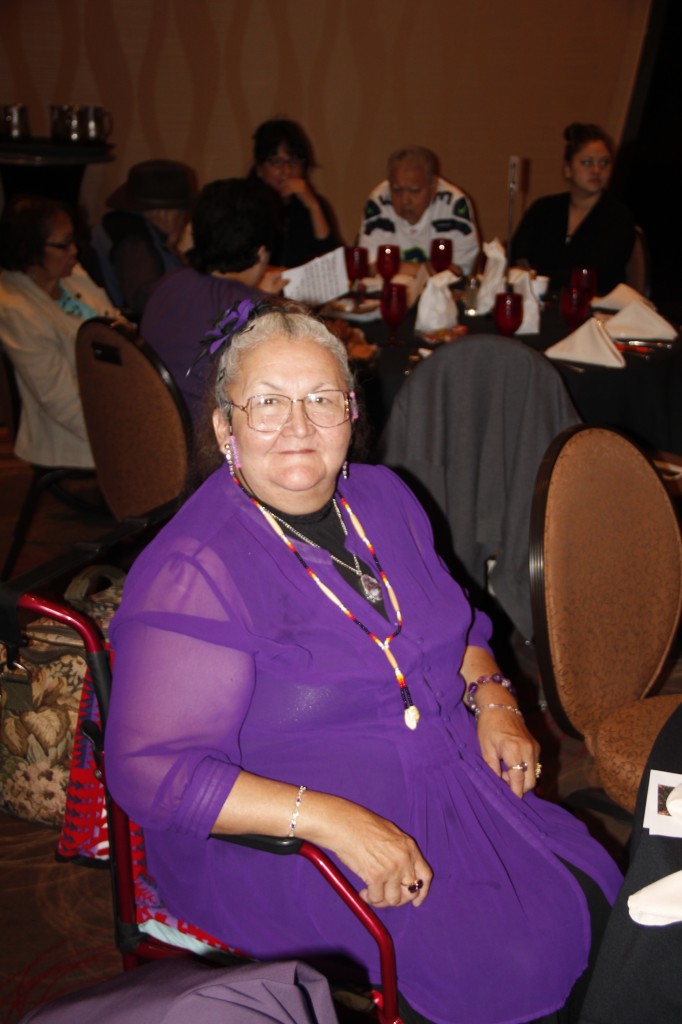
Photo: Andrew Gobin/Tulalip News
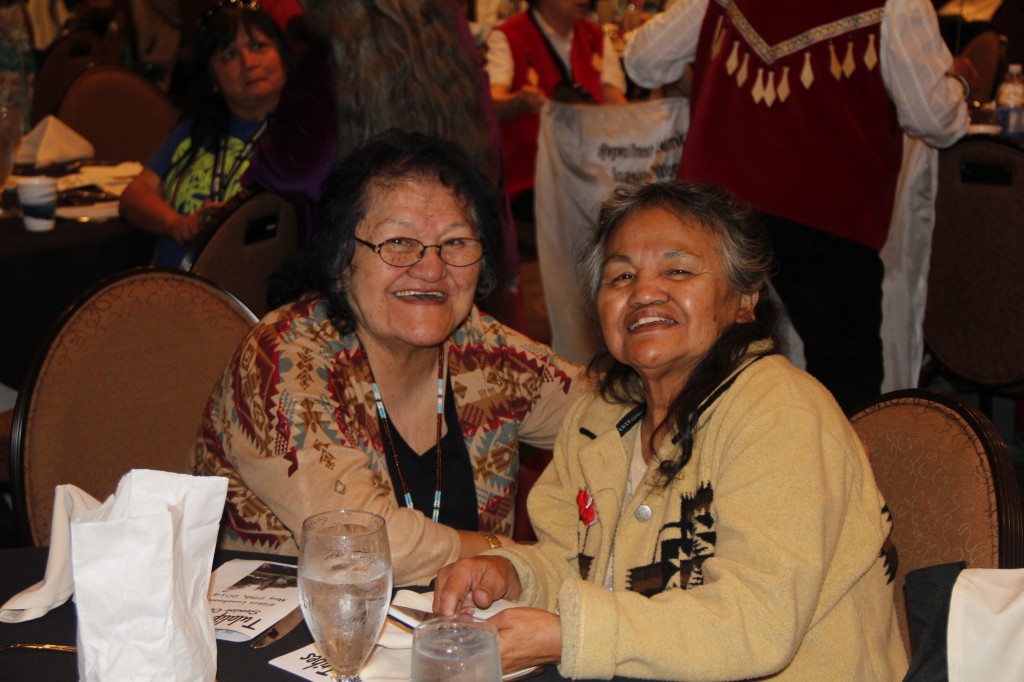
Photo: Andrew Gobin/Tulalip News
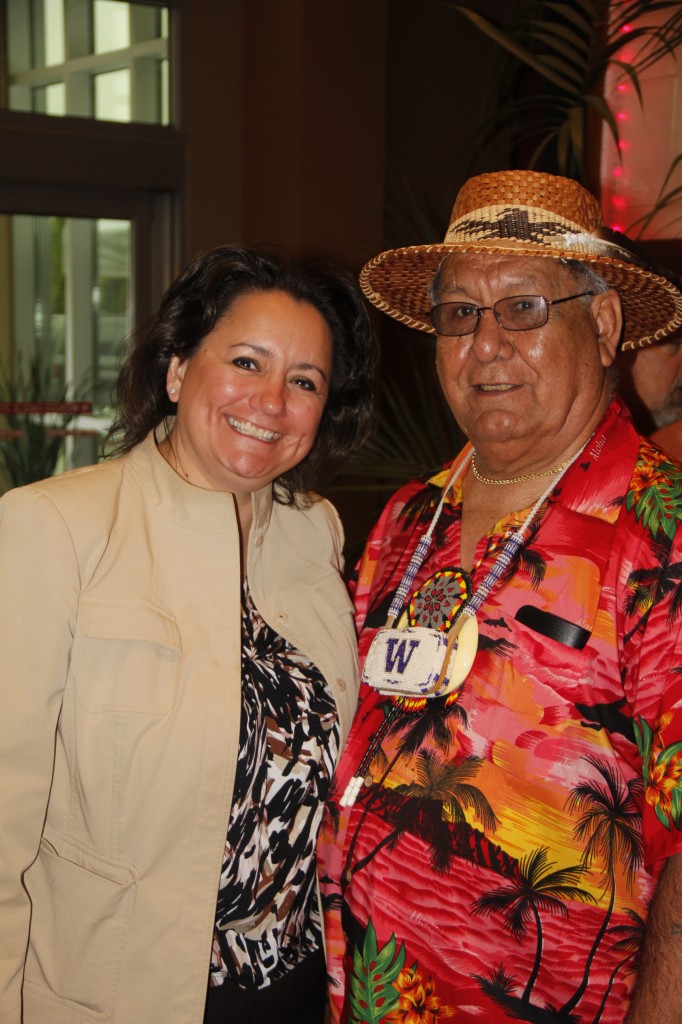
Photo: Andrew Gobin/Tulalip News
Related Links:
http://www.maryfest.org/FestivalDetails
Andrew Gobin is a staff reporter with the Tulalip News See-Yaht-Sub, a publication of the Tulalip Tribes Communications Department.
Email: agobin@tulalipnews.com
Phone: (360) 716.4188
Generations join in the spirit of slehal at the Tulalip Tribes Stick Game Tournament
By Andrew Gobin/Tulalip News, photos by Nessie Hatch-Anderson
On Saturday, May 31, 122 five-man stick game teams competed in the Tulalip Tribes Stick Game Tournament for $50 thousand at the Tulalip Amphitheater. On Sunday, June 1, 110 teams competed in the three-man tournament to close out the weekend of stick games.
“We heard a lot of people, young and old, say they really enjoyed the event, and they look forward to coming to Tulalip every year,” said Nessie Hatch-Anderson. “Family tradition is what we heard for this event. It was a clean and sober event, and it’s a tradition that goes way back to our ancestors.”
Slehal, a lushootseed word for bone games, hand games, or stick games, is a traditional form of gambling. Historically, it was also used as a way to settle disputes without violence. One of the Snohomish origin stories, depicted on one of three poles at the Tulalip Resort, tells the story of the beginning of the world, and how the humans and the animals played slehal to decide who would rule the earth, both a gamble and a dispute. Slehal honors that tradition.
Generations are brought together through stick games. Nessie’s mother, the late Barbara Hatch (Ane-Cus), lived for traditional competitions, a passion that Nessie carries on.
“Stick games and canoe races, that’s what I remember growing up,” said Nessie.
Stick gamers that have gone on were remembered at the event.
Carrie Fryberg, who chairs the stick game committee, said, “We did an honor song to honor past stick game players that are very respected throughout Indian Country and the stick game community. Big Bill and Mimi Mclean, Louie and Cookie Moses, and many members of the Tom family, who sang their family honor song.”
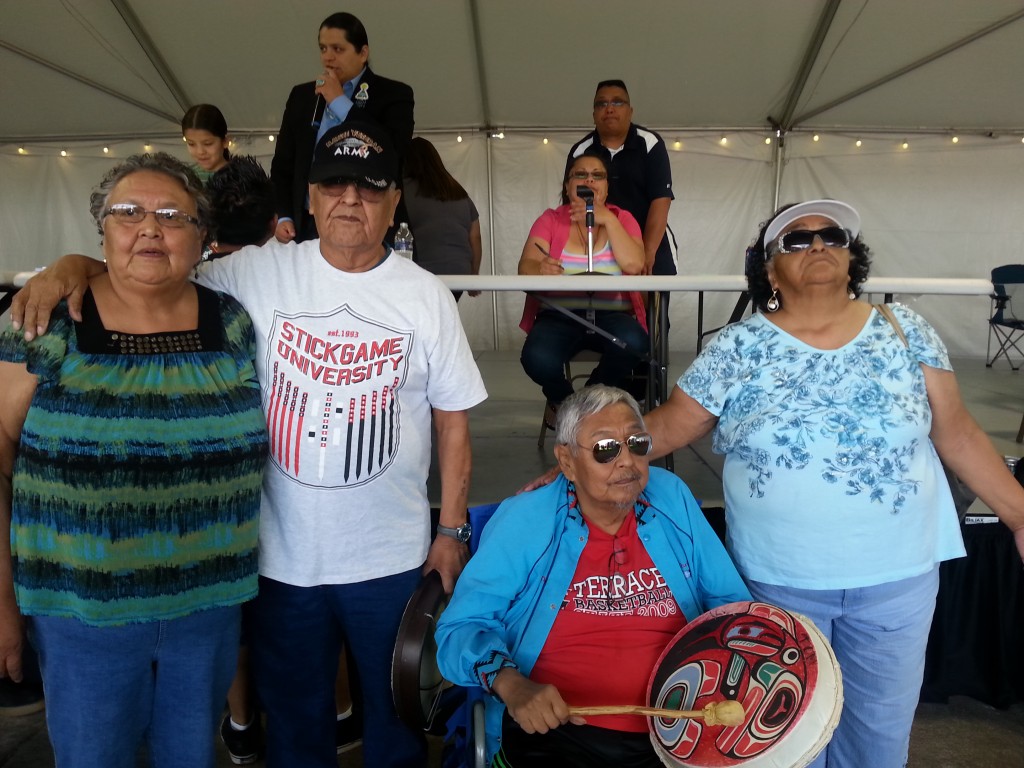
Photo: Nessie Hatch-Anderson
On Saturday, Candace Tait and her team from Lummi took first, and $25 thousand cash prize. Cassandra Kipp’s team from Lapwai came in second, winning $15 thousand, Effie Wall’s team from Fort Dushaine took third and $7,500, and Kevin Seaward’s team from Duncan took fourth and $2,500.
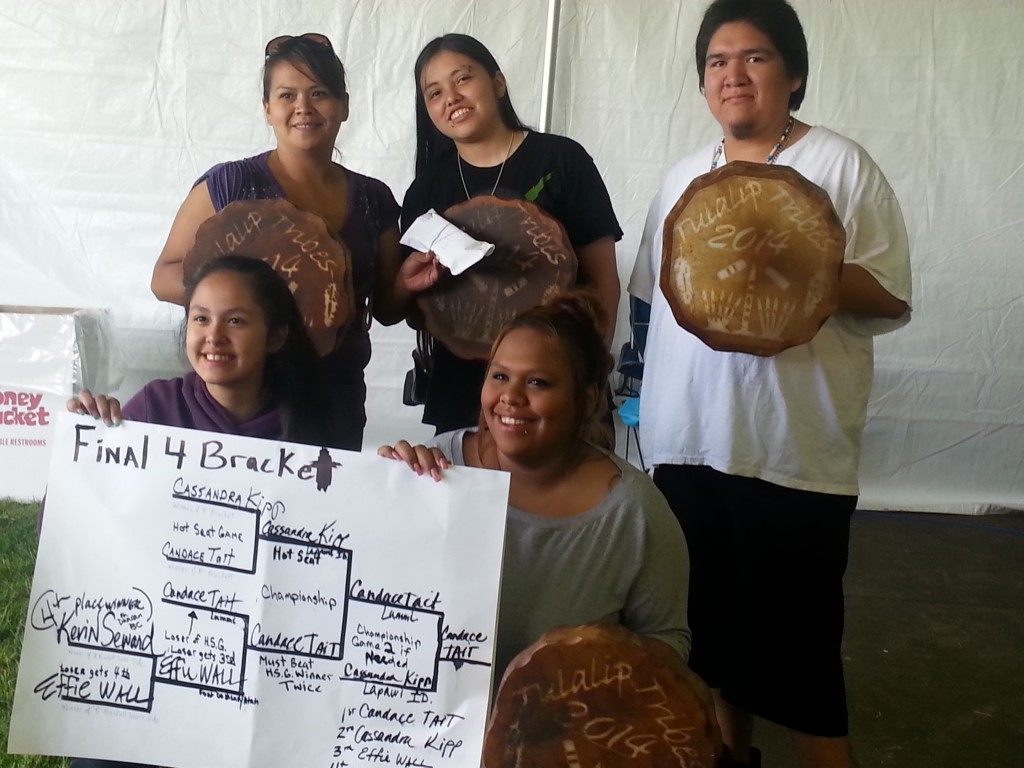
Photo: Nessie Hatch-Anderson
Al Tom’s team had an eight game winning streak, only to have upset in the championship bracket, taking fifth place and no winnings. They were only team from Tulalip to make it that far.
Mike Edwards and his three-man team from Muckleshoot won Sunday’s tournament.
The weekend was organized by the Tulalip’s Stick Game committee led by Carrie Fryberg.
Nessie said, “Carrie had everything organized pretty well. The weekend went very smoothly.”
Andrew Gobin is a staff reporter with the Tulalip News See-Yaht-Sub, a publication of the Tulalip Tribes Communications Department.
Email: agobin@tulalipnews.com
Phone: (360) 716.4188









